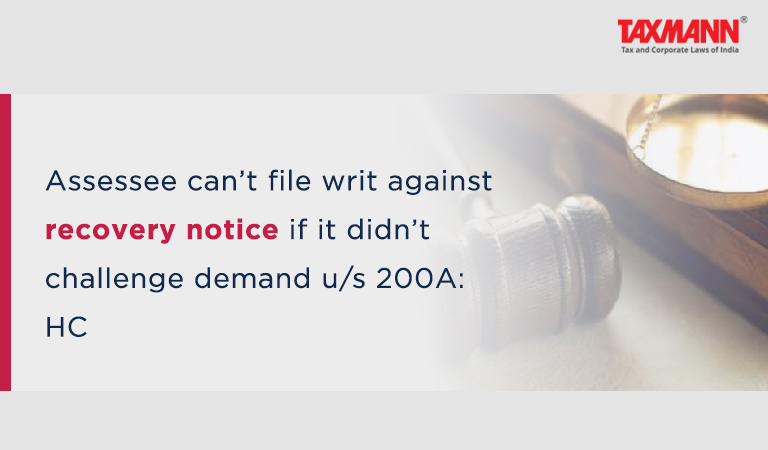Assessee can’t file writ against recovery notice if it didn’t challenge demand u/s 200A: HC
- Blog|News|Income Tax|
- 2 Min Read
- By Taxmann
- |
- Last Updated on 25 February, 2023

Case Details: Construction Engineers v. Union of India - [2023] 147 taxmann.com 193 (Jammu & Kashmir and Ladakh)
Judiciary and Counsel Details
-
- Sanjeev Kumar & Ms Moksha Khajuria Kazmi, JJ.
- R.A. Jain, Sr. Adv. & Aswad Atar, Adv. for the Petitioner.
- T.M. Shamsi, DSGI, Aatir Javed Kawoosa, & A. Hanan, Advs. for the Respondent.
Facts of the Case
Assessee-petitioner, a partnership firm, engaged in the business of construction of major projects including Bridges, Flyovers, Office Complexes, and other Roads and Buildings. Petitioner filed TDS returns in Form 26Q quarterly. While processing the TDS Returns, the Assessing Officer (AO) noticed that the assessee had not reported tax deductions in respect of salary payments.
Consequently, an intimation of outstanding demand under section 201(A) and a show-cause notice under section 221(1) was issued by the AO, to which the assessee did not respond. Since the demand was not contested, AO treated such demand as a formal demand and proceeded to recover the outstanding amount. AO issued a notice to the assessee’s bank.
Aggrieved by the order assessee preferred a writ petition before the High Court of Jammu & Kashmir and Ladakh.
High Court Held
The High Court held that the petitioner did not challenge the intimation issued by the AO under section 200A. The challenge to the notices issued under section 226(3) without challenging the intimation of demand made by AO under section 200A is not maintainable. The petitioner is only aggrieved by the notices issued upon the assessee’s Bank, which holds money for and on account of the Assessee, to deposit the outstanding liability standing against the petitioner.
Since no response was given by the petitioner to the intimation of demand, the intimation was treated as a notice of demand. There was a failure on the part of the petitioner to meet the demand and deposit the outstanding tax. The petitioner sought to contest the demand on merits that the entire tax deducted at source stood deposited and the demand raised was non-est in the eye of the law.
If aggrieved by the intimation of demand issued by AO, the petitioner is well within its rights to file an appeal before the jurisdictional Commissioner (Appeals), and cannot straightway approach this Court by invoking its extraordinary writ jurisdiction under Article 226 of the constitution of India.
It is needless to say that when a statute provides a mechanism for the redressal of grievances, the person aggrieved must go through the mechanism so provided. It is not permitted to rush to invoke the extraordinary writ jurisdiction when the statutory mechanism itself provides for the filing of statutory appeals and revisions.
Disclaimer: The content/information published on the website is only for general information of the user and shall not be construed as legal advice. While the Taxmann has exercised reasonable efforts to ensure the veracity of information/content published, Taxmann shall be under no liability in any manner whatsoever for incorrect information, if any.

Taxmann Publications has a dedicated in-house Research & Editorial Team. This team consists of a team of Chartered Accountants, Company Secretaries, and Lawyers. This team works under the guidance and supervision of editor-in-chief Mr Rakesh Bhargava.
The Research and Editorial Team is responsible for developing reliable and accurate content for the readers. The team follows the six-sigma approach to achieve the benchmark of zero error in its publications and research platforms. The team ensures that the following publication guidelines are thoroughly followed while developing the content:
- The statutory material is obtained only from the authorized and reliable sources
- All the latest developments in the judicial and legislative fields are covered
- Prepare the analytical write-ups on current, controversial, and important issues to help the readers to understand the concept and its implications
- Every content published by Taxmann is complete, accurate and lucid
- All evidence-based statements are supported with proper reference to Section, Circular No., Notification No. or citations
- The golden rules of grammar, style and consistency are thoroughly followed
- Font and size that’s easy to read and remain consistent across all imprint and digital publications are applied



 CA | CS | CMA
CA | CS | CMA
